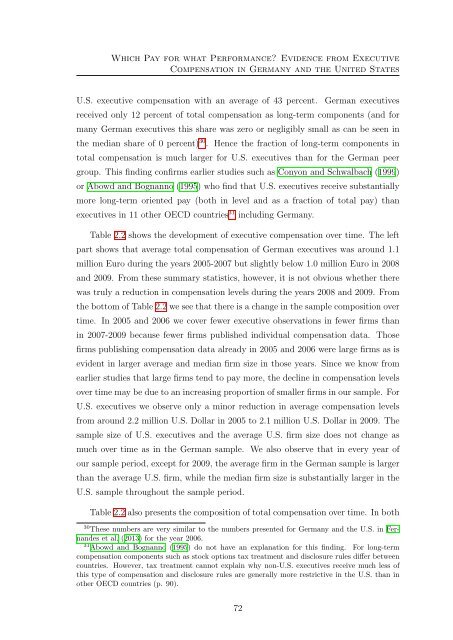Three Essays on Executive Compensation - KOPS - Universität ...
Three Essays on Executive Compensation - KOPS - Universität ...
Three Essays on Executive Compensation - KOPS - Universität ...
You also want an ePaper? Increase the reach of your titles
YUMPU automatically turns print PDFs into web optimized ePapers that Google loves.
Which Pay for what Performance? Evidence from <strong>Executive</strong><br />
Compensati<strong>on</strong> in Germany and the United States<br />
U.S. executive compensati<strong>on</strong> with an average of 43 percent.<br />
German executives<br />
received <strong>on</strong>ly 12 percent of total compensati<strong>on</strong> as l<strong>on</strong>g-term comp<strong>on</strong>ents (and for<br />
many German executives this share was zero or negligibly small as can be seen in<br />
the median share of 0 percent) 30 . Hence the fracti<strong>on</strong> of l<strong>on</strong>g-term comp<strong>on</strong>ents in<br />
total compensati<strong>on</strong> is much larger for U.S. executives than for the German peer<br />
group. This finding c<strong>on</strong>firms earlier studies such as C<strong>on</strong>y<strong>on</strong> and Schwalbach (1999)<br />
or Abowd and Bognanno (1995) who find that U.S. executives receive substantially<br />
more l<strong>on</strong>g-term oriented pay (both in level and as a fracti<strong>on</strong> of total pay) than<br />
executives in 11 other OECD countries 31 including Germany.<br />
Table 2.2 shows the development of executive compensati<strong>on</strong> over time. The left<br />
part shows that average total compensati<strong>on</strong> of German executives was around 1.1<br />
milli<strong>on</strong> Euro during the years 2005-2007 but slightly below 1.0 milli<strong>on</strong> Euro in 2008<br />
and 2009. From these summary statistics, however, it is not obvious whether there<br />
was truly a reducti<strong>on</strong> in compensati<strong>on</strong> levels during the years 2008 and 2009. From<br />
the bottom of Table 2.2 we see that there is a change in the sample compositi<strong>on</strong> over<br />
time. In 2005 and 2006 we cover fewer executive observati<strong>on</strong>s in fewer firms than<br />
in 2007-2009 because fewer firms published individual compensati<strong>on</strong> data. Those<br />
firms publishing compensati<strong>on</strong> data already in 2005 and 2006 were large firms as is<br />
evident in larger average and median firm size in those years. Since we know from<br />
earlier studies that large firms tend to pay more, the decline in compensati<strong>on</strong> levels<br />
over time may be due to an increasing proporti<strong>on</strong> of smaller firms in our sample. For<br />
U.S. executives we observe <strong>on</strong>ly a minor reducti<strong>on</strong> in average compensati<strong>on</strong> levels<br />
from around 2.2 milli<strong>on</strong> U.S. Dollar in 2005 to 2.1 milli<strong>on</strong> U.S. Dollar in 2009. The<br />
sample size of U.S. executives and the average U.S. firm size does not change as<br />
much over time as in the German sample. We also observe that in every year of<br />
our sample period, except for 2009, the average firm in the German sample is larger<br />
than the average U.S. firm, while the median firm size is substantially larger in the<br />
U.S. sample throughout the sample period.<br />
Table 2.2 also presents the compositi<strong>on</strong> of total compensati<strong>on</strong> over time. In both<br />
30 These numbers are very similar to the numbers presented for Germany and the U.S. in Fernandes<br />
et al. (2013) for the year 2006.<br />
31 Abowd and Bognanno (1995) do not have an explanati<strong>on</strong> for this finding. For l<strong>on</strong>g-term<br />
compensati<strong>on</strong> comp<strong>on</strong>ents such as stock opti<strong>on</strong>s tax treatment and disclosure rules differ between<br />
countries. However, tax treatment cannot explain why n<strong>on</strong>-U.S. executives receive much less of<br />
this type of compensati<strong>on</strong> and disclosure rules are generally more restrictive in the U.S. than in<br />
other OECD countries (p. 90).<br />
72
















